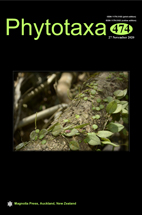Abstract
During a study of the limno-terrestrial diatoms on King George Island (South Shetland Islands), an unknown Navicula taxon was observed. Detailed morphological analysis based on both light and scanning electron microscopy observations revealed a unique set of morphological features, that were not observed in any Navicula taxon known so far. Despite an extensive literature search, it was not possible to identify this taxon and therefore it is described as a new species: Navicula massalskiana sp. nov. At present, the new species has only been observed from its type locality, acid soils influenced by penguin excrements, close to the seashore in the Admiralty Bay Region (King George Island). Navicula massalskiana shows a high similarity with two other Antarctic species: Navicula skuae and Navicula shackletonii. The taxonomic situation of these two taxa is investigated. The type material of Navicula skuae was reinvestigated and compared with the published morphological description of N. shackletonii. Based on this comparison, both taxa are clearly conspecific making N. skuae a later synonym of Navicula shackletonii.

